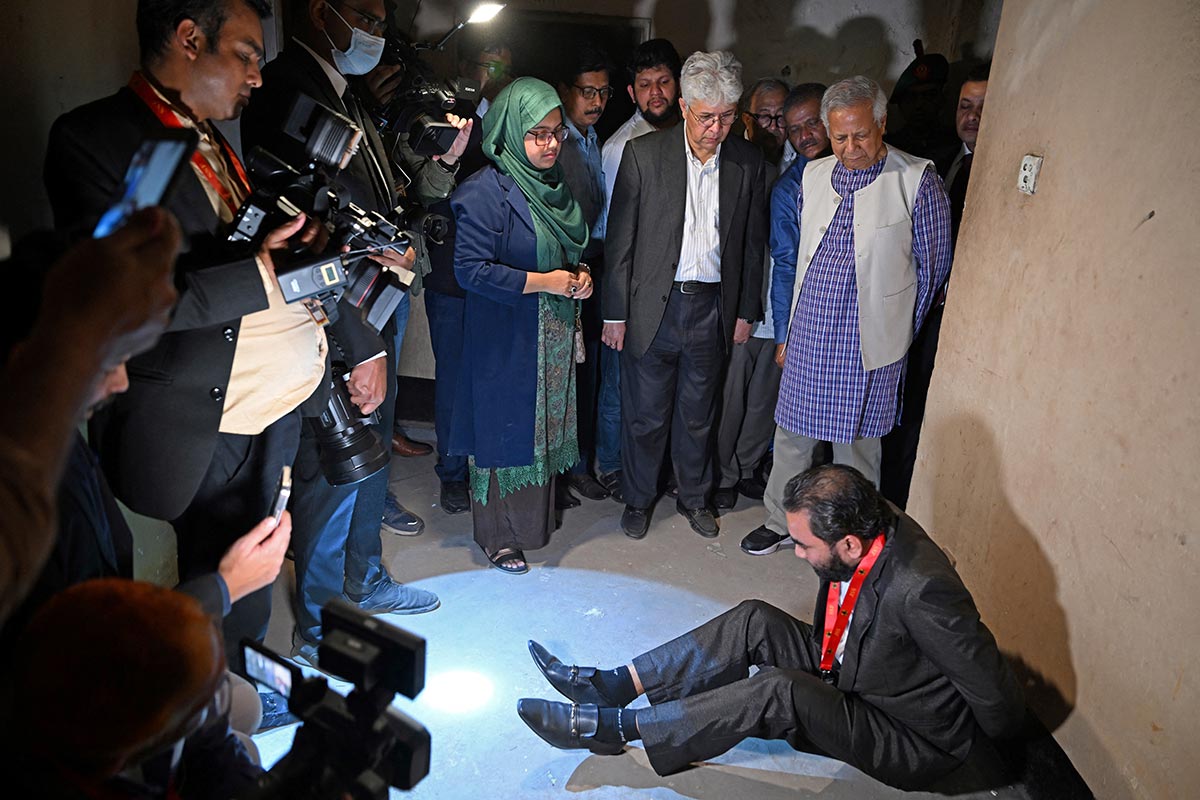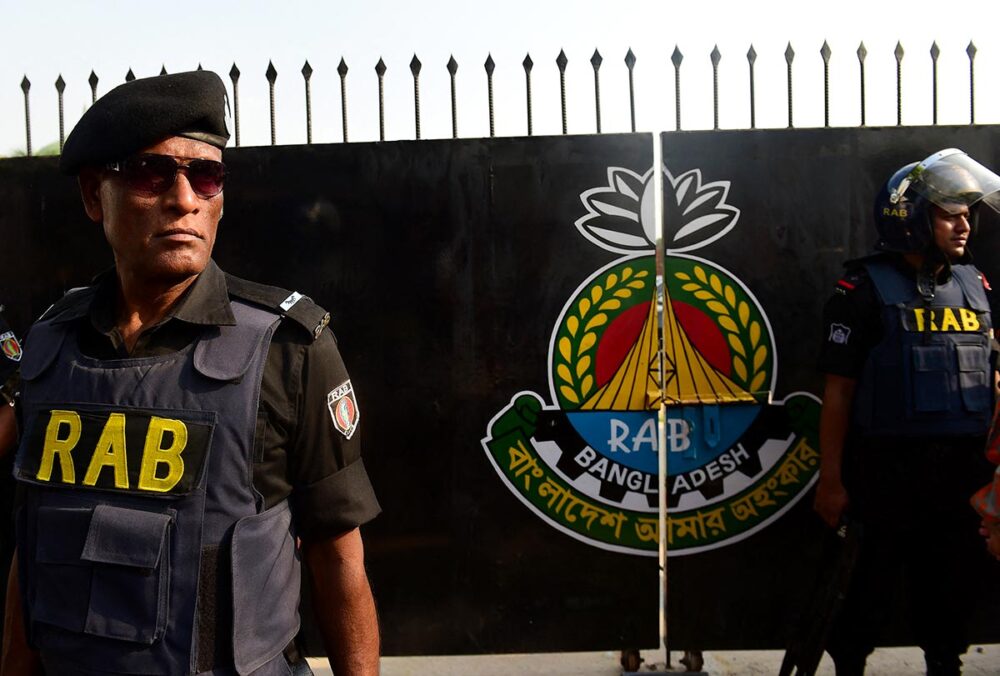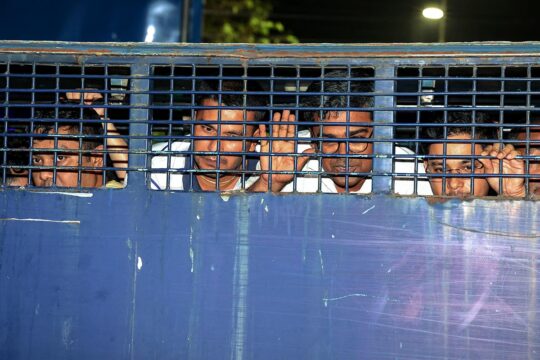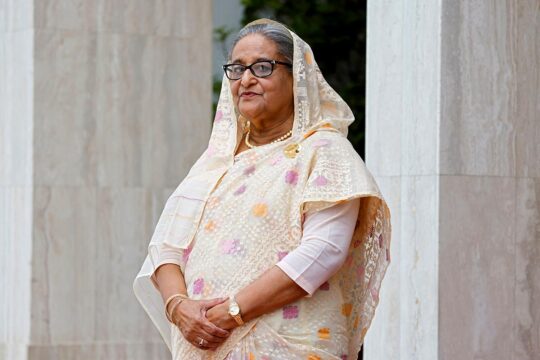Last week, Bangladesh’s International Crimes Tribunal (ICT) has issued arrest warrants for “crimes against humanity” against 24 former or serving army officers, a retired head of police and two politicians, including the former prime minister Sheikh Hasina, for their alleged role in enforced disappearances between 2016 and 2024.
In response to the warrants, the Bangladesh military have said that they organised the detentions of 15 serving army officers in a building within an army cantonment in the capital city of Dhaka, which the Home Ministry has designated as a sub-jail. However, two of these army officers were detained in relation to another indictment, submitted to the ICT on the same day, involving killing during the July-August 2024 protests.
The warrants were issued on 8 October 2025, after the Chief Prosecutor of the ICT submitted two indictments alleging that enforced disappearances were “widespread and systematic” during the long period of the Awami League rule (2009-2024).
Concerns regarding military custody
This move was hailed by UN’s Human Rights Chief Volker Türk, who said that the initiation of proceedings against those accused of carrying out enforced disappearances and torture “was an important step towards accountability” and “a significant moment for victims and their families.” “This marks the first time that formal charges have been brought for enforced disappearances in the country,” Türk highlighted.
“I urge full respect for the most scrupulous standards of due process and fair trial, as guaranteed in international law. The protection of victims and witnesses in these sensitive and significant cases must be ensured,” the High Commissioner for Human Rights said.
In its 8 October order, the Tribunal judges require the accused to surrender themselves to the Tribunal by or on October 22. The Tribunal will then have to decide whether the men should be detained in a normal prison or in the sub-jail within the army cantonment or bailed.
The anti-corruption organisation Transparency International Bangladesh has raised concern over the government’s decision to keep the arrested officers in military custody in the cantonment area. “If other accused persons can be held in civilian custody under regular procedures, what is the justification for establishing specialised sub-jails for accused military officers?”, the NGO’s executive director, Iftekaruzzaman said.
However, the Ex-Forces Association, a platform of former military and paramilitary personnel, urged the government to try accused army officers under military law in coordination with the ICT. At a press briefing at Dhaka Reporters Unity, the Ex-Forces association expressed concern over what it described as “malicious attempts by vested quarters at home and abroad to create confusion between the armed forces and the people and to undermine national unity.”
Rapid Action Battalion cells
One of the new indictments involves 13 army officers at senior positions with the Rapid Action Battalion (RAB), an elite law enforcement agency, comprising police and military officers, which ran a detention cell called Task Force for Intelligence (TFI) inside the RAB-1 battalion compound, in Uttara, a neighbourhood of Dhaka, the capital of Bangladesh, which secretly imprisoned dissidents, political opponents and others believed to be threats to the Awami rule.
One of the detained at TFI include the lawyer Mir Ahmad Bin Quasem, who was secretly held there for nearly 8 years between 2016 and 2024. He was released the day the prime minister Hasina fled to India, after widespread popular protests calling for her resignation.
The Chief Prosecutor, Tajul Islam, told the ICT in his application for arrest warrants that the TFI cells were operated and controlled by RAB’s intelligence wing and became “one of the main detention centres for enforced disappearances.” He added that apart from the TFI, custodial facilities of the 14 other RAB battalions across the country, which were meant to hold suspects within the lawful period of custody, “were used as major detention sites for enforced disappearances.”
The 13 army officers targeted by the arrest warrants either ran RAB, or were in charge of its operations or of its intelligence units.
In 2021, under the Global Magnitsky Human Rights Accountability Act, the US government imposed sanctions on the Rapid Action Battalion, and six of its most senior officers, over its role in extra judicial killings during its “war on drugs.” The Act allows the US government to sanction those responsible for serious human rights violations or corruption.
The House of Mirrors
The other indictment involved ten army officers at senior positions within the Directorate General of Forces Intelligence (DGFI), the country’s military intelligence agency, which reports directly to the prime minister. The ten officers either held the position of Director General of DGFI, or were head of the Counter Terrorism and Investigation Bureau, a unit within DGFI that had responsibility for the maintenance of a detention cell called Joint Interrogation Cell (JIC) situated within the army cantonment.
Although the facility was officially called the JIC, Islam said that once it became known that people were being secretly detained and tortured there, it came to be known as “Aynaghar” (House of Mirrors). “However, during the period when detainees were held there, the secret detention centre was often referred to as the Art Gallery,” he said.
One of those secretly detained at Aynaghar was the retired Brigadier Abdullahil Amaan Azmi, who was released on the same day as Quasem after being imprisoned illegally for 8 years. Both Mir Ahmed and Brigadier Azmi were sons of men convicted at the ICT for crimes committed during the country’s 1971 war in their role of leaders of the Islamist party, the Jamaat-e-Islami. These trials, that had taken place when the Awami League was in power, were criticised for serious due process lapses. Ahmed’s father was executed whilst he was being secretly detained.

Hasina and her military adviser accused
The former prime minister Hasina and her (retired) military adviser, Major General Tariq Ahmed Siddiqui are the number one and number two accused in both enforced disappearance indictments.
The former Home Minister, Asaduzzaman Khan Kamal, and the former Inspector General of Police, Benazir Ahmed, who had previously run RAB between 2015 and 2020, are both accused in the case involved RAB.
All four of these accused have either fled Bangladesh or are no longer in the country, while at least nine of the accused senior army officers are understood to be absconding.
The indictments follow two reports published by a Commission on Enforced Disappearances set up by the current interim government. The commission had earlier recorded 1,772 cases of enforced disappearance between 2009 and 2024, with 345 individuals remaining unaccounted for and in its first report published in December 2024 had concluded that Hasina was “prime facie responsible for acts of enforced disappearances”.
In his application, the Chief Prosecutor also read out to the ICT judges parts of the indictments, alleging that “among the various strategies adopted by the Awami League government to obstruct legitimate political activities – using its extreme political ideology and the rhetoric of a perpetual ‘war against global terrorism’ as a shield – the most heinous of all was the commission of internationally recognized crimes against humanity such as enforced abduction, detention, disappearance, and torture.”
He added that “this culture of enforced disappearance was created under direct orders from the highest levels of government” and that “no effective steps were taken to stop these crimes nor to punish those who committed them.” He also explained that “such incidents of abduction or disappearance usually took place at night. The victims were forcibly taken from their homes, workplaces, or the streets into vehicles (usually microbuses). Their eyes were then blindfolded, and their hands were cuffed. The operation would happen so swiftly that people nearby often couldn’t even realize someone had been abducted.”
In many cases, the abducted were later tortured for information about their political affiliation. “During interrogation in custody, some victims were given electric shocks to their genitals and various parts of the body. Others were made to sit on a rotating electric chair, which was then switched on to spin rapidly in the name of ‘questioning.’ Many were brutally beaten,” Islam wrote in the application. “Some of those who were forcibly disappeared were killed. At times, the bodies of these ill-fated individuals were found; at other times, their remains were completely destroyed.”
A political “vendetta”
Mohammad Arafat, the Awami League spokesperson, said that “the entire ICT process is a complete sham. The judges, prosecutors, and even defence lawyers are all affiliated with the Islamist organization Jamaat-e-Islami and its offshoot, the Amar Bangladesh party. The act under which this trial is being conducted was never intended to cover such crimes, and the subsequent amendments were left incomplete since none were passed in parliament. Moreover, all amendments made after August 5, 2024, are being applied retroactively, in clear violation of international legal conventions.” He went on to add: “This is essentially a vendetta orchestrated by the Awami League’s rival, Jamaat-e-Islami — the very party that took part in the genocide during Bangladesh’s liberation war.”
It is unclear when the trial will start or how long it will take, but there is political pressure for the process to be completed by the time of the elections in February. The ongoing trial of Hasina is coming to an end, with the Chief Prosecutor on Thursday finishing his closing arguments and asking the Tribunal to impose the death penalty on the former prime minister and home minister, both of whom are not present in the country.







